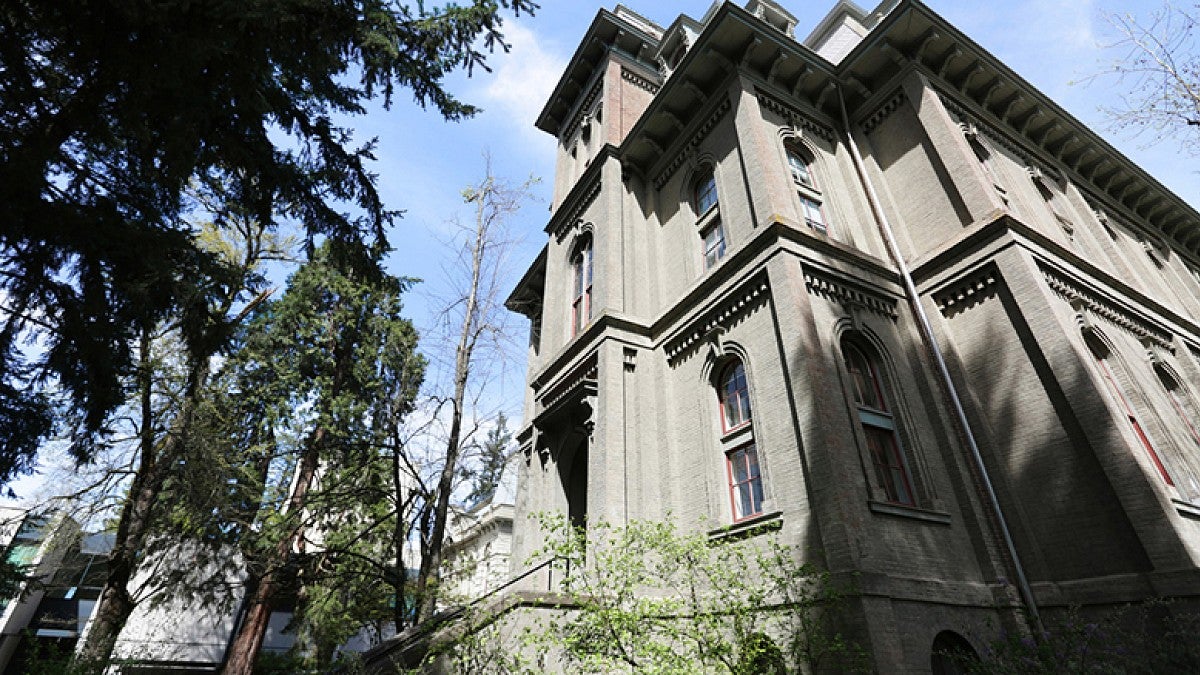Andrew Colas, a member of the Board of Trustees of the University of Oregon, has asked the board to consider denaming Deady Hall, the oldest building on campus. The board will schedule a special meeting in the coming weeks to take up the request.
The building is named for Matthew Deady, a prominent figure in Oregon’s early history and the first president of what was then the university’s Board of Regents. As the state’s first federal judge, he was also a supporter of slavery.
In 2016, following extensive research and a robust campus engagement process, the board voted to change the name of Dunn Hall, a residence hall that has since been renamed Unthank Hall, but did not take up the matter of Deady Hall.
“One of the decisions I’ve been really regretting was allowing us not to rename Deady Hall; it kept me up last night,” said Colas, who went on to call for the board to revisit the issue. Colas added that he “cannot accept” a campus building named for someone “that would see me and believe that I am as good as a ‘horse, cattle or a piece of land,’” he said, quoting Deady. “That wrecks me inside.”
Colas, president of Portland's Colas Construction and a 2004 graduate of the Charles H. Lundquist College of Business, was appointed to the inaugural board in 2013.
Oregon’s public meetings laws require certain government bodies, including the UO’s board, to provide adequate advance notice to the public and news media about any topic of discussion during a meeting. Colas’ comments were impromptu, so the board was unable to take immediate action on his request.
Board Chair Chuck Lillis said Colas’ comments “meant a lot to a lot of people” and that the board will take up his request in a way that complies with Oregon’s public meetings laws.
“Andrew’s comments were powerful and courageous,” said President Michael H. Schill. “I fully support his call for the board to revisit the question of denaming Deady Hall. Once again, recent events in this country have exposed the deep-seated and systemic racism that remains pervasive in our society, and I believe we must continue to question our historic positions and assumptions around these challenging issues.”
In February 2016, the university undertook a process of considering whether to rename two buildings on campus at the request of the campus’ Black Student Task Force. The group submitted a list of 13 demands to the president, including a call to “change the names of all of the KKK related buildings on campus.”
Schill empaneled a committee of faculty members, staff and students to consider a set of criteria for whether the buildings should be renamed. In August 2017, the campus and greater community was invited to review the historians’ 34-page report and comment. The president shared information and a set of principles for how he would make his recommendation.
Those criteria included a statement, “Bigotry and racism have no place in our society or our university.” The criteria stated that students must feel valued and included, the UO must be careful not obscure history so has to learn from it, and “denaming has symbolic value. But symbols are less important than actions that affect the material circumstances of members of our community.”
In September 2016 the president announced that he would request that the board remove the name of Frederic S. Dunn from Dunn Hall. The board of trustees voted to strip Dunn’s name from the building and ultimately renamed it in honor of DeNorval Unthank, Jr., an alumnus of the School of Architecture and Allied Arts, now the College of Design, who spent his life advocating for minorities and designed many local buildings, including some on the UO’s campus.
The historians’ report on the life of Matthew Deady painted a more complicated picture of Deady’s record on race and service to Oregon. Also, the community input was evenly split between naming and not renaming the building. Schill decided to seek additional community input and extended the deadline until students returned to campus.
After additional input and deliberation, Schill decided against renaming the Deady Hall. He vowed to continue to work toward creating an inclusive, diverse campus.
That work included opening the Lyllye Reynolds-Parker Black Cultural Center, creating the Umoja Black Scholars community, forming an African American Opportunities Program, accelerating efforts to recruit African American students to the university, hiring African American faculty members and creating a Black Studies Program.
More information about the board’s special meeting — including the date, topics or action items, and public viewing options — will be available as soon as possible on the board’s website.


